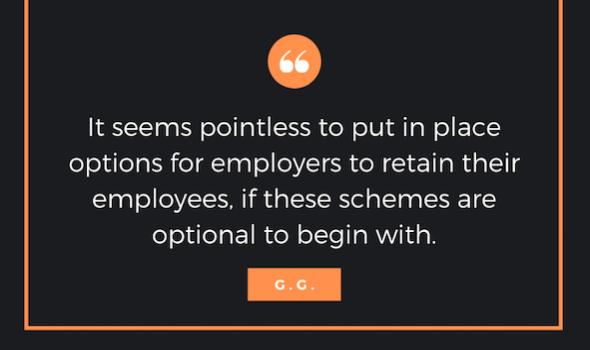Unfairlough
Unfairlough

I am a 28-year old professional, fluent in six languages, who relocated to London roughly three years ago to continue my studies in the UK, where I recently completed my Masters degree.
Ending up jobless seemed like something that wouldn’t happen to me. Since January 2020, I’ve been working as a Business Consultant and I had a permanent contract with my US-based company, which is registered in the UK.
You can imagine my surprise when, during one of our daily e-calls in early April, my whole team and I were informed that the client we were working with had cancelled the contract days before, and that we would be made redundant within one week. From heaven to hell in seven days. At first, we were all speechless. Despite finding it strange that they only communicated this very important piece of information days after it had happened, I did not know what to say nor how to respond.
Then, after doing some research online, I realised that the UK Government had implemented a furlough scheme and the so-called “Coronavirus Job Retention Scheme”. The rationale behind that was to prevent employers making massive layoffs and avoid a scenario where hundreds or thousands of people would end up jobless. As a result, I headed towards our second e-meeting with more confidence about an optimistic outcome.
After being reassured by a couple of HMRC operators over the phone about the eligibility of my company to put both my team and me on this retention scheme, I gathered all the relevant information to be transmitted to my employer.
But my numerous attempts to talk to ACAS, HMRC, a couple of lawyers and other legal and labour advisers were useless, in that it appears that it is true indeed that the UK Government has put in place this job retention scheme but is failing to ensure that employers use it. In fact, the UK Government only recommends CEOs to choose this option, which is funded by the state, but in the end, they still have the power to choose not to adopt such a measure, and release people with short notice. Which in fact is what happened to me.
Companies may be making this decision partly because of delays in payments from the Government. As explained to me by a HMRC operator, the first pay-outs to employers that will enable them to pay 80% of employees’ salaries are due to be released around now (the end of April), which may be too late for some businesses.
When you are from another country, one of the first things you tend to do in times of crisis is to compare the quality of life between your current state of residence, and your native country.
On the one hand, I have so much to blame Italy for, particularly regarding the lack of fair job opportunities for well-educated people, which is causing Italy’s brain drain and is the reason why I relocated to London. On the other hand, I am proud that my country is at the forefront of healthcare and does not leave anybody without medical care, no matter whether you are an Italian native citizen or an immigrant. Moreover, the Italian government has actually obliged companies to retain their employees by putting them in what we call “Cassa Integrazione” (the Italian version of a furlough scheme). Brexit failed to encourage me to leave the UK, but as an immigrant who recently lost his job under unfair circumstances, I am now considering either heading back to my native country or looking for other professional options elsewhere.
I am deeply grateful for what I’ve achieved in the UK and the opportunities I’ve had here – but I’m now disappointed too. It seems pointless to put in place options for employers to retain their employees, if these schemes are optional to begin with.
However, there is also something good and positive in this story. I discovered that my landlord is even more special and kind than I already knew. I think he deserves to be named, at least by his surname. Once he became aware that I’d lost my job, Mr Murphy spontaneously offered to reduce my rent for the next three months. This way, it would be as if he had gifted me with one-month free rent. I offered to repay him later, but he replied: “You know what? This is a present. These are very difficult times, never mind that.” There is still light at the end of the tunnel, after all.
I am looking at this difficult situation as an opportunity to keep studying, reading, learning, and to focus my attention and energies on what makes me happy, and on the career path I really want to follow. What happened may be a blessing. It is probably the ‘wake-up call’ I needed. I will figure this out in a little while.
What I am also focusing on is opening people’s eyes to the way some companies treat their employees and to the reality of the schemes put in place by the UK Government, in the hope that no more people in the UK or Europe in general will experience such unfair treatment in the future.


